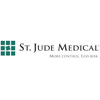
St. Jude Medical (NYSE:STJ) today won FDA approval for the next generation in its portfolio of high-voltage devices, which include safety features that overcome some common problems with implantable defibrillators.
St. Jude’s newly approved Ellipse and SJM Assura portfolio of implantable cardioverter defibrillators and cardiac resynchronization therapy defibrillators are designed to ensure that the implants are able to continue delivering life-saving therapy even if one part of the system has a short. The devices also feature a low-friction coating that prevents lead-to-can abrasion, which St. Jude calls "the most common type of lead insulation failure in the industry."
The distinction is an important one for St. Jude, which as been embroiled in a high-profile recall over failure in some of its older defibrillator leads. The company in 2011 was the subject of a Class I FDA recall over its Riata leads after reporting that the devices were failing more often than expected.
"St. Jude Medical strives to deliver the highest levels of patient safety. The new Ellipse ICD and SJM Assura family of devices support those efforts by providing added features that ensure effective therapy delivery," St. Jude implantable electronic systems president Dr. Eric Fain said in prepared remarks. "We are pleased that the FDA approved these devices, allowing us to bring important safety and system reliability enhancements to patients."
The FDA win is more good news for St. Jude and its cardiac rhythm management business, which recently reported the closure of a federal investigation into the recalled Riata leads. St. Jude revealed last month that a U.S. Justice Dept. probe had closed without incident or allegations of misconduct.

